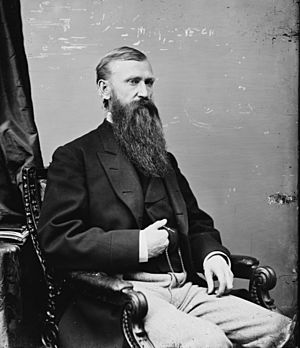Norton P. Chipman facts for kids
Quick facts for kids
Norton Chipman
|
|
|---|---|
 |
|
| Delegate to the U.S. House of Representatives from the District of Columbia's at-large district |
|
| In office April 21, 1871 – March 3, 1875 |
|
| Preceded by | Constituency established |
| Succeeded by | Constituency abolished |
| Personal details | |
| Born |
Norton Parker Chipman
March 7, 1834 Milford Center, Ohio, U.S. |
| Died | February 1, 1924 (aged 89) San Francisco, California, U.S. |
| Political party | Republican |
| Spouse | Mary Holmes |
| Children | 2 |
| Education | Washington College Cincinnati Law School (LLB) |
Norton Parker Chipman (March 7, 1834 – February 1, 1924) was an important American figure. He was an army officer during the American Civil War. He also worked as a military lawyer, a politician, an author, and a judge.
Contents
Biography
Early Life and Education
Norton Chipman was born in Milford Center, Ohio. His family later moved to Iowa when he was young. He studied law and graduated from the Cincinnati Law School in 1859.
Military Service in the Civil War
When the Civil War began, Chipman joined the Union Army. He was a Lieutenant Colonel in the Second Iowa Infantry. During the Battle of Fort Donelson, he fought bravely. He was badly wounded and thought to be dead. But he survived and recovered!
After his recovery, he was promoted to colonel in 1862. Chipman fought alongside Ulysses S. Grant at Fort Donelson. This battle was Grant's first big victory. Chipman later worked for important generals. He also became a lawyer for the army.
Life in Washington, D.C.
In 1864, Chipman moved to Washington, D.C. He worked for the War Department. There, he was the lawyer who led the case against Captain Henry Wirz. Wirz was the commander of Andersonville Prison. This was a very harsh prison camp during the war. Many Union soldiers died there. Wirz was found guilty and punished in 1865. Chipman later wrote a book about this famous trial. It was called The Tragedy of Andersonville.
After the war, President Ulysses S. Grant appointed Chipman to a high position. He became the Secretary of the District of Columbia. Later, he was elected to Congress. He served two terms as a delegate for the District of Columbia.
The Story of Memorial Day
Norton Chipman was involved with the Grand Army of the Republic (GAR). This was a group for Civil War veterans. He received an idea from a friend. The idea was to honor soldiers who died by decorating their graves. Chipman liked this idea very much. He decided the day should be in late spring. This would ensure there were plenty of flowers.
He declared May 30, 1868, as Decoration Day. This day was for decorating the graves of fallen Civil War soldiers. News of this spread across the country. Decoration Day later became Memorial Day.
However, the full story of Memorial Day is a bit more complex. While Chipman's name was on the official order, many people contributed to the idea. Historians now believe that Mary Ann Williams and a group of ladies in Columbus, Georgia, were the first to organize such a day. They did this even earlier. So, while Chipman helped make it a national day, the idea had roots in other places too.
Political Career in Congress
When Grant became president in 1868, Chipman helped with the inauguration. In 1871, a new law changed how Washington, D.C., was governed. Chipman was again appointed Secretary of the District of Columbia. He held this job for a short time.
Chipman was nominated to be the first delegate to Congress for D.C. He was friends with President Grant. He also had lived in the District for a long time. He won the election against Richard T. Merrick.
In Congress, Chipman worked hard for D.C. He supported many public projects. He proposed bills to build schools. He also wanted to finish the Washington Monument. Other ideas included building a new bridge over the Anacostia River. He also worked to improve the Washington harbor. When some people criticized the city's public works, Chipman strongly defended them.
He ran for reelection in 1873 and won again. In 1874, Chipman suggested that Georgetown should become part of Washington. He also wanted to change its street names to match Washington's. He also tried to make the federal government pay property taxes for its buildings in D.C.
In 1875, Congress changed the District's government again. Chipman's position as delegate was ended.
Later Years and Judicial Career
In 1876, Chipman moved to Red Bluff, California. He became involved in business and served on the California State Board of Trade. He even became its president.
Later, he became a judge. He served as a supreme court commissioner in California from 1897 to 1905. In 1906, California's governor appointed him. He became the first head judge of the new California Third District Court of Appeal. He held this important job until 1921. He retired because of his health.
Norton Chipman passed away on February 1, 1924, in San Francisco. He was 89 years old. He is buried in Bellefontaine Cemetery in St. Louis, Missouri. A small memorial to him is in the library of the California Third District Court of Appeal. In 2006, his old law school honored him. They renamed their local law student group after him.
Personal Life
Norton Chipman married Mary Isabel Holmes in 1865. They had two children. Their son, Robert Holmes, died very young. Their daughter was named Alice Helen.
In Popular Culture
Norton Chipman's role in the Andersonville trial was very famous. It inspired a movie called The Andersonville Trial. This film won an Emmy Award in 1970. William Shatner played Norton Chipman in the movie.
 | Anna J. Cooper |
 | Mary McLeod Bethune |
 | Lillie Mae Bradford |

